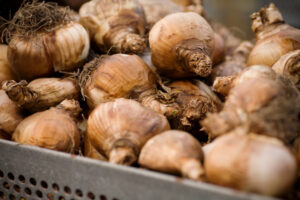Anybody with a green thumb can tell you the many great reasons for storing plant bulbs  between seasons. This is especially important for dahlias, gladiolas, and bulbe jonquille.
between seasons. This is especially important for dahlias, gladiolas, and bulbe jonquille.
If you dig up your bulbs instead of leaving them in the ground over the winter, it’s essential to check the health of your stored bulbs. This helps prevent moisture buildup, mold, mildew, and other potential threats. Taking time to inspect your stored plant bulbs can save you hours of frustration later. Follow these tips from our NJ garden center to identify and remove rotting bulbs.
Why It’s Important to Check Stored Bulbs
If you leave your bulbs unchecked, you risk starting the spring planting season with nothing but bad bulbs. Infection from one bulb can quickly spread to others, compromising your entire collection.
What Healthy Bulbs Should Look Like
A healthy, ready-to-plant bulb will be plump and firm. For example, if you’re planting tulips, expect the bulb to have small scales on its surface. Most other bulbs will have a smooth, velvety texture, similar to a soft spring leaf.
The outer layer of a bulb, known as the tunic, may appear split or loose around planting time. This is completely natural and even considered a positive trait by many arborists, as it can encourage rooting.
The “Bucket Test” for Checking Bulb Health
One of the best ways to check the health of your bulbs is the “bucket test.” Simply:
- Place about six bulbs into a bucket of water.
- Healthy bulbs will sink.
- Floating bulbs are likely rotten and should be discarded, as the rot makes them lighter and causes them to float.
Storing Healthy Bulbs
If your bulbs are healthy but you’re not ready to plant yet, make sure to dry them thoroughly before storing them. Wet bulbs can develop mold if left damp for too long.
Identifying Bad Bulbs
A bad bulb will have a soft, nearly squishy interior and may show signs of mold or fungus on its exterior. Discard these bulbs immediately, along with any nearby bulbs that could be infected.
Save Money by Properly Managing Your Bulbs
By properly storing and checking your bulbs, you won’t need to purchase new ones each planting season. It may take a few years to accumulate a good stock of bulbs and seeds while practicing effective bulb management, but the effort will pay off.
With good bulb care, your garden can thrive season after season without unnecessary costs. But, if you find yourself needing more bulbs, we have a plentiful stock of bulbs available at our NJ garden center.
Need Help with Your Garden?
If you’re preparing for this planting season and still have questions, contact Mendham Garden Center. Our experts can help you make sure your garden is ready to grow.
